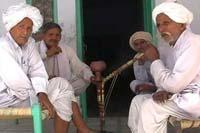1,000 honour killings in India every year

By Mata Press Service
Nineteen year old Asha was tortured to death along with her 20-year-old boyfriend Yogesh Kumar in north Delhi’s Swaroop Nagar area.
When police found the couple, they had multiple stab wounds.
Police have accused Asha’s father, her uncle, her cousin, her aunt and her mother in the murders.
The family told reporters they “have no regrets whatsoever”.
Not too far away from where this couple lived, cousins Shobha and Monica grew up walking to school together and sharing their secrets.
Monica, 23, fell in love with Kuldeep Singh, 26 and married him with the help of Shoba four years ago.
Shoba also helped her sister Khushbu, a model, to elope with a man from another caste.
Shobha, Monica and Kuldeep were each shot twice in the head on the evening of June 20.
Their suspected murderers are Shobha’s brother, Mandeep. The other was Monica’s brother, Ankit. The third was a local boy known to them both.
Earlier in Delhi, 22-year old Nirupama Pathak wanted to marry another fellow journalist who was her batch mate but hailed from a lower caste. She was found stangled. Her mother has been arrested.
Last week in Haryana’s Fatehabad district, a teen boy and a girl were found dead under mysterious circumstances and police arrested the two maternal uncles of the girl for killing the couple.
Shyam Mohammed and Reena, around 17 to 18 years of age, were also found dead in the open fields in Smain village of the same district.
According to police, Shyam and Reena wanted to marry but their families and the local village council was against the alliance.
Belgium-based Amritpal Kaur had fallen in love with Lakhwinder Singh, who belongs to a lower caste, and her parents didn’t approve of the relationship.
So they lured her to the Sikh holy city of Amritsar and poisoned her last week.
These are just some of the 20 cases of honour killings reported in Northern India over the past three months.
In addition to brothers gunning down sisters, mothers strangling their daughters and uncles orchestrating the murders of their kin in the cities of India, village councils or khap panchayats from Jharkhand, Haryana, Tamil Nadu and Andhra Pradesh are also enforcing the age old practice of gotra which prohibits intermarriage within the clan and in many cases the same village.
All in all, experts believe that more than 1,000 young people in India are murdered every year in honour killings Chandigarh-based legal experts Anil Malhotra and his brother Ranjit Malhotra said recently at the International Child Abduction, Relocation and Forced Marriages Conference organised by the London Metropolitan University.
In a joint paper, they said: “Forced marriages and honour killings are often intertwined. Marriage can be forced to save honour, and women can be murdered for rejecting a forced marriage and marrying a partner of their own choice who is not acceptable for the family of the girl….honour killings are basically ‘justified’ as a sanction for ‘dishonourable’ behaviour.”
Stung by international criticism and shocked by the recent spate of killings, India’s political parties of various stripes have all called for specific legislation to curb this social menace.
But village elders and members of the khap panchayat have warned that any such legislation will only make matters worse.
In an Indian media report, Rajkumar Numberdar, a khap panchayat leader of Narnoud village was quoted as saying: “It is not as if girls and boys did not fall in love earlier. But, of late, it is becoming difficult to control them because they know they just need to elope and ask for police protection. If politicians want to foist their warped ideas on us, why don’t they first kill off village elders?”
Another village councilor, Rajveer Dhanda said: “If the government sends these elopers to jail instead of giving them police protection, the malaise will be taken care of in no time.”
Fabian Dawson, deputy editor-in-chief of The Province newspaper in Vancouver, Canada, said these so called honour killings not only shame India but also its vibrant and powerful diaspora around the planet.
“On one hand we have post-modern India signing nuclear deals and on the other we have a tribal system that kills young people because they fall in love, giving the impression that India is still in the medieval era,” said the veteran journalist of South Asian descent, who exposed the sensational honour killing of British Columbian beautician Jaswinder Kaur in news stories and documentaries. (see justiceforjassi.com).
Veteran Bollywood actor Om Puri, who plays a village head against same-clan marriages in his next film “Khap...A Story of Honour Killing”, agrees.
“This is a very grave topic. It is so disturbing when you see that these honour killings are not happening in any remote area, but in the heart of the country. It is creating a bad impression about our country in the international circuit,” Puri told IANS.
Alarmed by the steep rise in suspected honour killings, India’s central government has decided to bring a new bill providing for the prosecution of the entire khap panchayat for ordering violent punishment for young couples marrying against their rulings.
Law and Justice Minister M. Veerappa Moily said under the new law, members of khap panchayat, who order the killing of the couples who dare to go against the dictates of these panchayats will be treated as accomplices in the crime.
The Congress and the Bharatiya Janata Party (BJP), India’s main political forces also sought strict action against the culprits in cases of honour killings.
The BJP said that honour killings were cold-blooded murders and demanded setting up of fast-track courts to deal with such cases.
The Congress favoured a specific law to deal with honour killings.
“If the existing criminal laws of the land are not sufficient, the government should consider a suitable law,” Congress spokesperson Jayanthi Natarajan told reporters.
– with IANS









